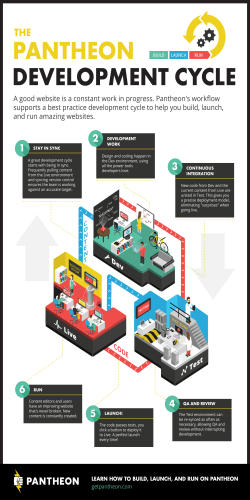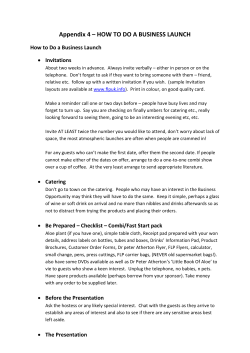
Planning Successful Company and Product Launches Marketing & Sales Roundtable September 2004
Marketing & Sales Roundtable Planning Successful Company and Product Launches September 2004 Agenda 11:30 – Introductions/Objectives 11:45 – Company and Product Launches: Presentation and Discussion 1:15 – Summary and Wrap-up ©2004 Rosemary Remacle 2 The Importance of Launches “A company….must choose a launch strategy that is consistent with its intended positioning. The launch strategy should be the first step in a grand plan for life-cycle marketing.” Philip Kotler Marketing Management Does your product launch plan reflect all of the money and time put into developing the product? ©2004 Rosemary Remacle 3 Some Factoids • 85% of new B2B products are failures • 95% of new consumer products are failures • Failures = doesn’t meet company objectives, withdrawn from market within 12-18 months Source: New Product News ©2004 Rosemary Remacle 4 Positioning Strategy Process Market Vision Market Drivers Technology Enablers Customer/ End-User Problem(s) Definition Market/Customer Segmentation Competitive Differentiation Strategy Evidence Market Segment Market Entry Customer Segment Critical Need and Total Product Requirements Positioning Strategy Statement Customer Segments Company Total Product Solution’s Potential Differentiators Total Product Assets Critical Needs Competitors’ Total Product Solutions’ Potential Differentiators Applications Product/Market Category Mission Statement ©2004 Rosemary Remacle Technology and Total Product Roadmap Partnerships Company Product/ Service Match Barriers to Adoption Market Entry Customer Segment Roadmap and Market Segment Leadership Roadmap Company Differentiator Business Model (Functional) Programs 5 Positioning Both Company and Product Company Positioning Strategy • Market • Technology • Product • Company Product #2 Product #1 Product #3 • Technology • Functions/Benefits • Technology • Functions/Benefits • Technology • Functions/Benefits ©2004 Rosemary Remacle 6 Launch Objectives • Unite company around shared objective: making the launch successful • Provide strategy evidence of the company’s intent, and right, to be a market segment leader in product/service category • Build independent third-party validation, and strategy evidence, of positioning strategy • Start the ‘buzz’, market pull with a consistent message architecture • Support long leadtime sales cycles • Facilitate fundraising ©2004 Rosemary Remacle 7 Launch Objectives (con’t) • Establish core technology/system as an extensible platform for future products and partnerships • Establish broad-based awareness and credibility with xxx customer segment • Generate market momentum/Accelerate the sales cycle for Product XXX; delay customer purchase commitments to competitors ©2004 Rosemary Remacle 8 New Venture ‘Launch Phases’ • Company funding announcements: PWC MoneyTree, Venture Wire, etc. • Company: Stealth mode • Identify system lite: business cards, industry event attendance • Content-free microwebsite: contact info, investors, team, etc. (note: may have password-protected real site) • Phone listing • Company ‘launch’: Seeding the market • Company: team, market vision • Technology platform • Product category, general problem addressed • Product launch: Going ‘public’ • Positioning strategy: problem solved, market and market entry customer segment, competitive differentiation • Product details: ‘architecture’, technology and product roadmap • Key customers and partners (especially channels) • Pricing and product availability information • A ‘grown-up’ website ©2004 Rosemary Remacle 9 ‘Pre-Announcing a Product’?* • Why? • • • • Complex problem/solution = market education Big budget line item product = long budget cycle, complex buying process Competitive pressures Need market ‘buzz’ for funding round • Risks? • • • • • Too much competitive information, too early Market environment can change substantively Product development slips ‘Obsolete’ an existing product Analysts/Media won’t cover ‘the real deal’ * Often executed as a ‘crescendo launch,’ a series of targeted announcements leading up to product launch ©2004 Rosemary Remacle 10 ‘Pre-Announcing’ Tips • Do • Describe key elements of technology • Explain benefits of technology/potential applications enabled • Articulate initial total product assumptions (services, standards, partnerships, etc.) • Don’t • Name product, provide specifications • Announce pricing • Provide precise launch date ©2004 Rosemary Remacle 11 Launch Dependencies: Strategy Evidence Product Concept Go/No Go Preliminary Positioning Strategy Go/No Go Business Model Beta Product & Reference Customers Positioning Strategy Validation Go/No Go Be prepared to postpone for key pieces of strategy evidence! Launch Planning Strategic Partnerships (channel) Go/No Go Post Sales Support Plan 18 months ©2004 Rosemary Remacle Ongoing Market Reinforcement Launch Date 12 Launch Plan Outline • • • • • • • • • Positioning Strategy Statement and Message Architecture Objectives and Strategies Competitors/Competitive Response Market leverage/Influencer plan Sales training and lead generation (closed loop) Marketing programs materials Schedule/Timeline Momentum milestones Appendix - positioning toolkit - customer segment profile - buying decision process ©2004 Rosemary Remacle 13 Launch Checklist: Some Strategy Evidence Options Positioning Toolkit • Sales, channel strategy • Product Release schedule Programs • Ads, site sponsorships • CD, Flash demo • Customer seminars • Data sheets, application notes • Direct mail, e-mail, list promotions • Newsletters • Sales, channel launch; training • Trial, swap-up program • Trade shows, conferences, events; suite briefings • Advance press and analyst tour • Speaker program • Regional field sales champions • User groups, customer councils • Webcasts/Webinars with guest experts: customers, analysts, partners • Lead management system…salesforce.com, eloqua, etc. ©2004 Rosemary Remacle Materials • Brochures • Data sheets, application notes • Presentations • Price lists • Product catalogs • Product demonstrations • Product roadmap • Press releases • Technical articles • Technology, company backgrounders • Testimonials • White papers • Web site update 14 Launch Manager is ‘Command and Control’ Weekly Status and Project Management Sales: Customer Advocates Content CTO/Guru: White Papers, Simulation Strategies Creative, Website, Interactive Marketing Launch Program Manager Shows, Conferences, Events ©2004 Rosemary Remacle Product Development/ Technical Marketing: Data Sheets & Demos Press/Analyst Relations, Materials Production Strategic Partners, Investor Relations 15 Launch Responsibilities Launch Strategy Marcom: Creative, Website, Interactive Marketing Product Marketing: Data Sheets & Demos Marcom: Press/Analyst Relations, Collateral Biz Dev: Strategic Partners Marcom: Tradeshows, Conferences, Events CTO/Guru: White Papers, Simulation Strategies Sales: Customer Advocates Content Finance: Investor Relations Product Development: Product Availability Launch Manager and Champion ©2004 Rosemary Remacle 16 Developing Strategy Evidence: Market Leverage Model Education Company I N V E S T O R S S A L E S C H A N N E L T A R G E T A C C O U N T S P A R T N E R S I N D U S T R Y A N A L Y S T S F I N A N C I A L A N A L Y S T S T R A E D D E I T P O R R E S S S B U S I N E S S E D I T O p R R S E S S Market Segment Market Entry Customer Segment Validation ©2004 Rosemary Remacle 17 Market Leverage/Influencer Plan Category Names Relationship/Objective/Program Company Owner Investors Sales Channel Beta Customers/ Targeted accounts Industry Partners, Leaders, Gurus Industry Organizations Industry analysts Financial analysts ©2004 Rosemary Remacle 18 Launch Pitfalls • Launch planning starts too late in product development process • Positioning strategy half-baked and untested, externally • Not enough (credible) strategy evidence: bug-free product, the right – at least one Tier 1 - customer testimonials and references (negotiated into contracts), application notes and documentation, channels, customer support • Proper market foundation has not been laid, no one has heard of the company or product • A non-programmatic approach (‘escapes’ vs. launches): lack of launch manager, market leverage and message models, launch objectives, plan, measurable goals • Lack of fully integrated plan (from product management to marketing communications to product development) ©2004 Rosemary Remacle 19 Summary and Wrap-Up The Launch Plan is the chance to get the company and product off to a good start in the market! ©2004 Rosemary Remacle 20 Presenters • Rosemary Remacle, Consultant Market Focus 408-244-0412 [email protected] ©2004 Rosemary Remacle 21
© Copyright 2026





![[WCR-300S] How to Change the Wireless Network Name(SSID)](http://cdn1.abcdocz.com/store/data/000232989_1-c13ffbaf9a88e423608ef46454e68925-250x500.png)




